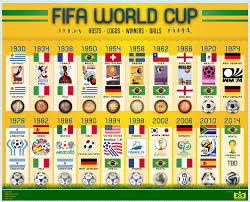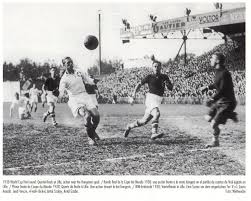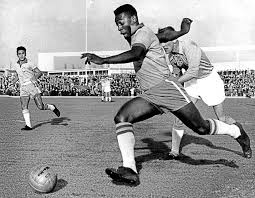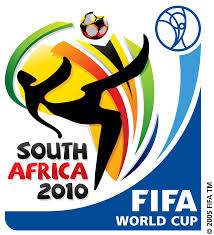History of the World Cup- An Idea that Caught on Quickly
How the World Cup Became the Biggest Football Event on Earth


Ready for International Play

It also helped that the International Olympic Committee accepted soccer as a sport in 1900 and that it was also included in the 1906 Intercalated Games. In 1908, FIFA was charged with overseeing football at the 1908 Summer Olympics. In 1906, FIFA attempted to organize an international competition outside of the Olympics, but this venture, which was hosted by Switzerland, was not successful. In 1914, FIFA acknowledged that Olympic competition would decide the world championship for amateur clubs. But in 1928, FIFA decided to develop and facilitate its own competition that would decide the world champion.
The World Cup in the 1930s

In 1934, the World Cup was held in Italy. The field was expanded to 16, and that number would remain intact until 1982. Egypt became the first African nation to compete in the event, which was won by the host country Italy. In 1938, with the world on the brink of war, France was chosen to host the competition. This was the first year that the nation that previously won the event received an automatic bid. Uruguay and Argentina, which has expected the third World Cup to be held in South America, boycotted the tournament. Austria, which had qualified for the final round of play, withdrew from the event due to the Anschluss in April 1938 by Germany. Italy won the titled for a second straight time.
1940s- 1978 Competition

The first World Cup to be televised was held in Switzerland in 1954. In the game between Austria and Switzerland, there were 12 goals scored, marking a record for total goals in a World Cup game. Austria won that match 7-5. West Germany beat Hungary 3-2 for the title.
The 1958 event, which has hosted by Sweden, saw Pele come into his own, as he scored two goals in the final, helping Brazil take the crown. This was the first World Cup where a team from another continent won the championship.
1960s- 1978

In FIFA World Cup history, 1966 marks the first time that organizers focused a lot of effort in marketing. First the first time, the World Cup has an official logo and a mascot, as England welcomed competitors. In the end, it was the host country that emerged as World Cup champions.
Mexico hosted the 1970 competition, as Brazil beat Italy in the finals 4-1. The 1974 World Cup, which was held in West Germany, was won by the hosts. They beat the Netherlands 2–1 in the final. Once again in the next World Cup, which was held in 1978, the country hosting the event, Argentina, won it all. They beat the Netherlands 3-1.
1982- 1998

Italy hosted its second World Cup in 1990. As it had been in the previous competition, the final game came down to West German and Argentina. However, the outcome was different, as West Germany took down Argentina 1-0.
For the first time, the U.S. played host to this topflight tournament in 1994. This was the first final where penalties decided the winner, as Brazil was victorious over Italy. France hosted in 1998, beating Brazil in the final game 3-0.
New Millennium

The 2006 event, which was hosted by a reunited Germany, saw Italy and France battle it out in the final game, which Italy won in a shootout 5-3. This was first time since 1938 that the previous champions did not receive and automatic berth. In 2010, South Africa was selected as the venue for the tournament. Spain won it all, as they defeated the Netherlands 1-0 in the 116th minute of extra time. In what was a highly defensive, low-scoring event, Spain scored just eight goals in seven games.
The last World Cup, which was played in 2014, saw German beat Argentina a second time 1-0 to take the title. The event was hosted for the second time by Brazil, which finished fourth, as the Netherlands took the bronze game 3-0. This marked the first time in FIFA World Cup history that three consecutive winners came from the same continent (Europe: 2006 Italy, 2010 Spain, 2014 Germany).
FIFA World Cup History – Champions
Our FIFA World Cup History offers some insights into those countries that have done the best in this competition. For more articles on this event, including those focusing on sports betting and soccer, please see our World Cup Hub.
- Brazil – 5 wins (1958, 1962, 1970,1994, 2002), 2 runners-up (1950, 1998)
- Germany – 4 wins (1954, 1974, 1990, 2014), 4 runners-up (1966, 1982, 1986, 2002)
- Italy – 4 wins (1934, 1938, 1982, 2006), 2 runners-up (1970, 1994)
- Argentina – 2 wins (1978, 1986), 3 runners-up (1930, 1990, 2014)
- Uruguay – 2 wins (1930, 1950), 0 runners-up
- France – 1 win (1998), 1 runner-up (2006)
- England – 1 win (1966), 0 runners-up
- Netherlands – 0 wins, 3 runners-up (1930, 1990, 2014)
- Czechoslovakia – 0 wins, 2 runners-up (1934, 1962)
- Hungary – 0 wins, 2 runners-up (1938, 1954)
- Sweden – 0 wins, 1 runner-up (1958)





